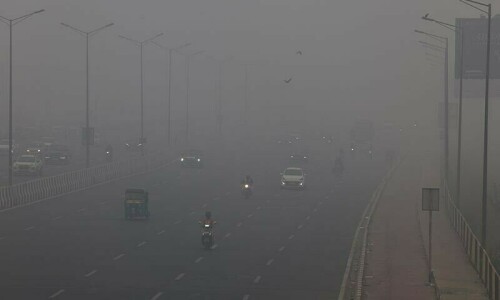
ISLAMABAD: Iranian President Mahmoud Ahmadinejad was assured by Pakistani leaders on Thursday that they remained committed to the gas pipeline and electricity import projects despite international sanctions on his country.
Although he couldn’t get a firm timetable for making the energy projects operational, he appeared to have been satisfied with pledges of speeding them up and, in return, offered to enhance bilateral trade to $10 billion in a couple of months.
More importantly, the two sides commenced discussions on currency swap and barter trade arrangements to circumvent the US sanctions for doing business with Iran in the dollar.
“The President (Asif Ali Zardari) reiterated commitment for expeditious implementation of Iran-Pakistan gas pipeline project, 1,000MW electricity transmission line and 100MW Gwadar power supply,” a statement issued by the presidency said.
The PM’s Office in a press-note on Prime Minister Yousuf Raza Gilani’s meeting with Mr Ahmadinejad said: “Both leaders agreed to pursue the energy projects including electricity and gas on fast-track basis. They also discussed the status of Iran-Pakistan gas pipeline.”
Iran has been worried that Pakistan could abandon the gas pipeline and electricity import agreements under pressure from the West because of sanctions and has been seeking categorical assurances from Islamabad about its continued commitment to the projects.
In the meetings at the presidency and prime minister’s house the two sides discussed ways of enhancing bilateral trade, including proposals for currency swap, barter trade, removing tariff and non-tariff barriers and improved border coordination for facilitating businessmen.
The statement from the presidency said: “President Zardari proposed for considering encouraging barter and trading in local currencies between the two countries besides removing tariff and non-tariff barriers.”
US sanctions on purchase of Iranian oil in dollars have already made several other countries, including Russia, India and Sri Lanka, to make payments in gold or their own currencies.
During talks at the prime minister’s house, the Iranian delegation expressed its desire to import one million tonnes of wheat and 2,00,000 tonnes of rice from Pakistan within weeks.
Following fresh sanctions, Iran has increased procurement of grain from the international market bypassing the banking restrictions by paying in currencies other than the dollar and euro.
Measures for controlling drug trafficking and fighting terrorism were also discussed at the meetings.
Both sides agreed to boost mutual coordination for countering terrorism, drugs and narcotics control and human trafficking, an official said.
President Ahmadinejad thanked Mr Zardari for Pakistan’s “keen interest in further strengthening existing cordial equation with Iran.”















































Dear visitor, the comments section is undergoing an overhaul and will return soon.